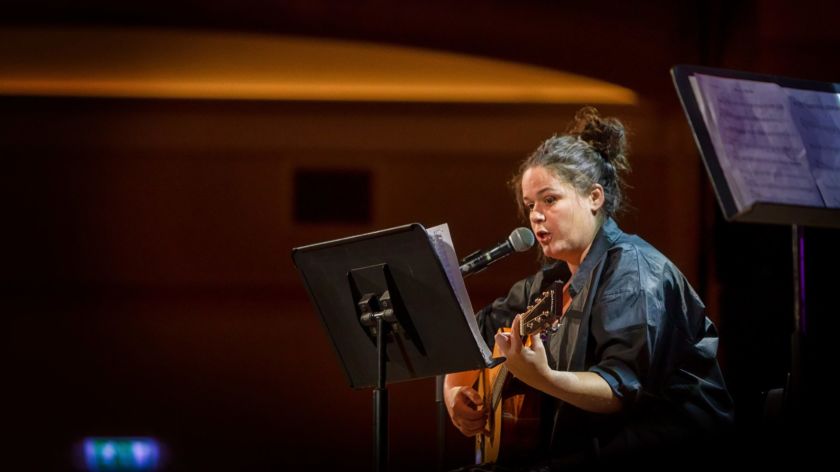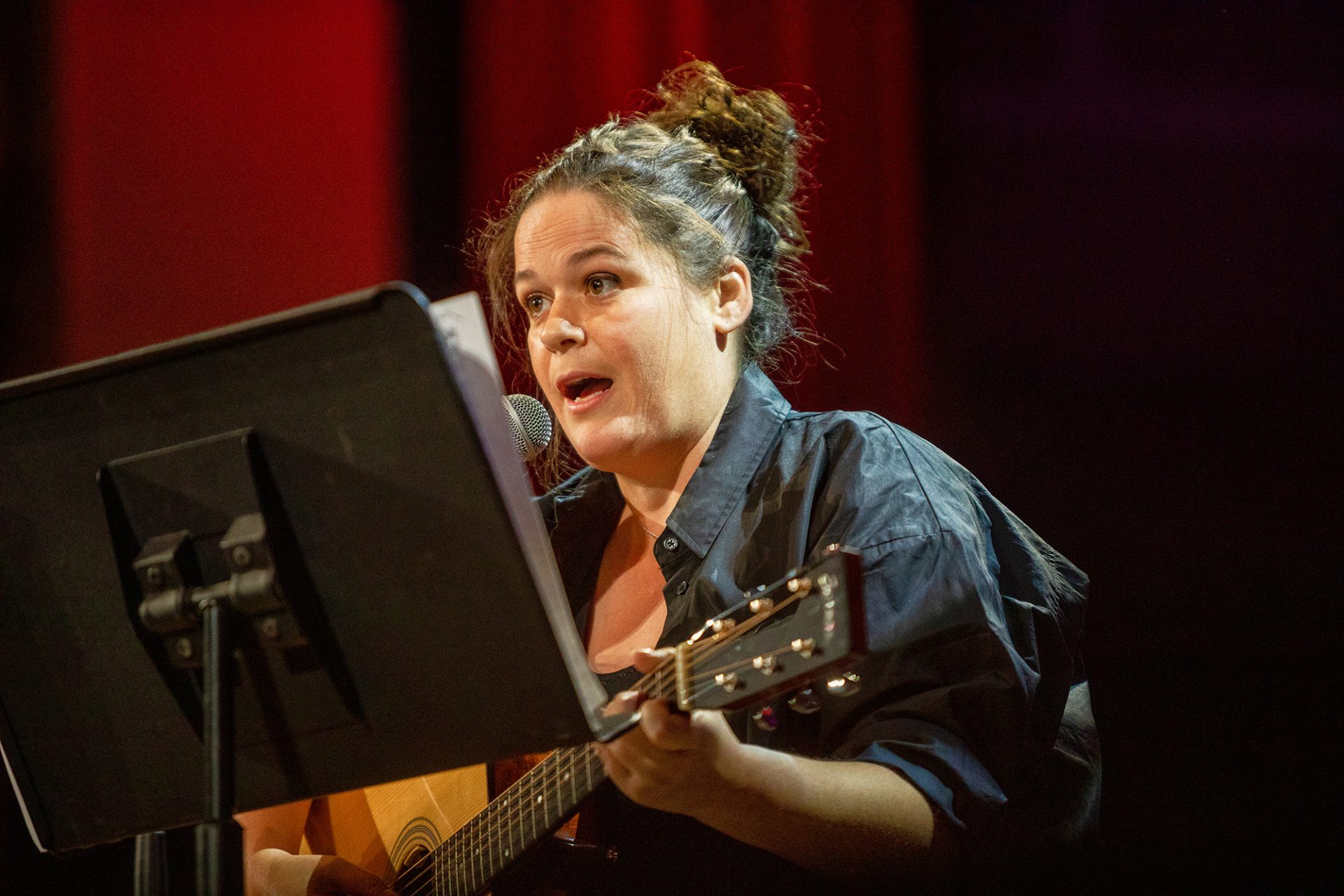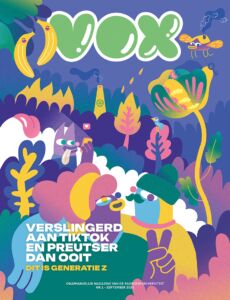Tanzania song leads to awkward moment at Opening Academic Year
-
 Katinka Polderman during the Opening of the Academic Year. Photo: Dick van Aalst
Katinka Polderman during the Opening of the Academic Year. Photo: Dick van Aalst
Not all those present at the opening ceremony of the academic year thought Katinka Polderman’s performance of her song ‘Tanzania’ was a laughing matter. The comedienne performed just after the awards ceremony of the Internationalisation award for a study program with several students and partners in African countries. ‘It was poor timing.’
Monday afternoon, in the Vereeniging. Comedienne Katinka Polderman is the final act of the Opening of the Academic Year of Radboud University. She starts her performance with a rendition of Tanzania, a song in which she voices a Dutch person wondering what happened to all the money she gave to Tanzania.
While it does elicit some laughs, a part of the audience squirms uncomfortably in their seats. Sara Kinsbergen is among them. The professor of Development studies and the programme director for AMID Young Professional received the Internationalisation award just moments before. ‘At AMID Young Professional we try to contribute to the decolonisation of international cooperation’, Kinsbergen says. ‘We try to move past the traditional North-South way of thinking.’
A video of two ‘change agents’ from Kenya and Uganda was shown at the awards ceremony. In it, they explaim how the AMID Young Professional programme trains them to meet the sustainable development goals. Immediately afterwards, Polderman walks on-stage. ‘We just talked about Kenya, now let’s talk about Tanzania’, she says at the start of her performance, before launching into the ironic song.
Decolonising
Dirk-Jan Koch, professor by special appointment of development cooperation, was incensed by the performance. The prevailing image of Africa and the African peoples is one of the biggest hurdles in Development studies and development cooperation,’ he says. ‘We are using a more equal approach, which is exactly why we won the award. The stereotypes used in the song are patently ridiculous.’
‘The stereotypes used in the song are patently ridiculous.’
The AMID-laureates very nearly arranged a livestream so their colleagues and students in Kenya and Uganda, according to Kinsbergen, so that they could follow the awards ceremony. ‘But in hindsight I’m very happy that they didn’t. I doubt our colleagues would have felt understood.’
The two social scientists do emphasize that the performance by Polderman – who was also Radboud’s artist in residence last year – was possibly simply an unfortunate confluence of events. ‘I believe that people like Katinka Polderman can make us think in ways that others can’t’, Kinsbergen says. ‘And in fact, her final song about ideals did exactly that.’ But the picture she painted about countries like Tanzania is still so very prevalent that I don’t think the actual message came across.’
Colonial Sentiments
Johan Oosterman, who brought Polderman to campus for the Gelders Erfgoedfestival (heritage festival), also felt that the performance of Tanzania was a bit awkward. ‘I noticed the same thing in the people around me’, he says. Oosterman has a sense of what went wrong. ‘For her second and third song, Polderman explained the ironic meaning beforehand, but she didn’t do so for the first one. And right after the Internationalisation award, that felt almost inappropriate.’

However, the programme director of Radboud Heritage also comes to Polderman’s defense, saying ‘anybody who gave it some thought, could tell that this was not Katinka’s opinion, but rather that of the character she portrayed: the upstanding citizen who believes that some gratitude is in order after all the support to Tanzania. It mocked latent colonial sentiments that still exist today. I’m a little familiar with Katinka, and I can imagine that she intended for us to feel a bit uncomfortable.’
Diversity and Inclusivity
Professor Ivo Nieuwenhuis writes reviews of comedy performances for Trouw, and he is presently working on a book about humor sccandals which is set to appear in May of 2023. He can recognise several mechanisms of such a scandal in the performance at the Opening of the Academic Year.
The expert in Dutch studies points out that Tanzania is one of the older works from Polderman’s repertoire: it first appeared on the CD Polderman Kachelt Door in 2011. ‘Subjects like diversity and inclusivity are much more prevalent than they were ten years ago. Comic songs that used to be considered funny are often seen as problematic today. Nowadays, people tend to say that this kind of song is no longer acceptable.’
‘Subjects like diversity and inclusivity are much more prevalent than they were ten years ago’
However, Nieuwenhuis does feel that a song like Tanzania would still fit in one of Polderman’s shows. ‘In that context it’s easier to consider it as an innocent song. But it’s a much more sensitive matter when performed at the Opening of the Academic Year, in front of an international audience that are likely unfamiliar with her work. That can lead to uncomfortable moments, which is, in fact, what happened.’
Open Assignments
The contents of Polderman’s performance were not known to Radboud University’s Executive Board beforehand. Nor should they be, according to university spokesperson Martijn Gerritsen. ‘The Executive Board continues to value providing open assignments to artists for their contributions to the Opening of the Academic Year.’
According to the spokesperson, the Executive Board understands that responses were mixed in the wake of Katinka Polderman’s performance. ‘Art is always open to interpretation, and it is a good thing that this can be discussed.’ The spokesperson declined to comment on the Executive Board’s personal opinions of the performance.
Katinka Polderman: ‘The context was not ideal.’
‘Of course, it was never my intention to make people sad or angry with my music’, according to Polderman. ‘I just wanted to contribute to a lovely afternoon.’
Polderman did receive a schedule of the Opening beforehand, but she did not know who would be awarded with the Internationalisation award. ‘It wasn’t until I was backstage that I heard the prize would go to AMID, and I heard someone mention ‘Nairobi.’ As that’s relatively close to Tanzania, I figured it would make for a nice segue. Sadly, things turned out different.’
At the time, Polderman couldn’t really tell that something was amiss. ‘The room was almost completely full, and I think a large part of the audience were familiar with my repertoire’, according to the comedienne. ‘I don’t think they would have been shocked by the song. Nor did I get any negative comments at the signing session afterwards; in fact, someone even complimented me on Tanzania. Anyone who feels hurt or offended by my work, can talk to me about it. I’m always available for discussion.’
The comedienne does want to take this time to explain what Tanzania is about. ‘I grew up in the eighties’, she begins. ‘At the time, Tanzania was always in the news, with everybody organising fundraisers. And now you barely hear anything anymore; our attentions have shifted away, while the situation probably hasn’t improved much.’
According to Polderman, comedy is about both form and content. ‘In terms of form, Tanzania is a kind of tearjerker song in the style of the ‘Zangeres-zonder-Naam’ (Nameless Songstress). Internationals are probably not familiar with this sort of thing and could feel offended. That context is important. Because the song came right after the awards ceremony, it might have seemed like it was written for the occasion. And in hindsight it makes sense that that context would lead to misunderstanding.’
Polderman has made some changes to the song over the years. An older version of the song on Youtube has her using the n-word when talking about Tanzanians. ‘That word was a bit less charged fifteen years ago’, according to the comedienne. ‘In the meantime, I’ve changed the word to ‘luitjes’ (folk); it took a process of becoming aware to do that.’



